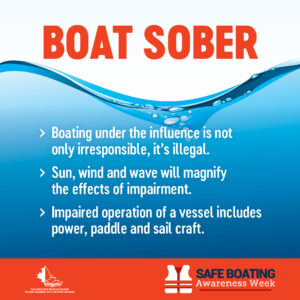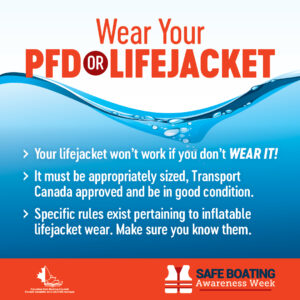Safe Boating Awareness Week May 20-26, 2023
Across Canada and North America, Safe Boating Awareness Week will be in full swing from May 20-26, 2023. Although, the highlight on safe boating is yearlong, Safe Boating Awareness Week is promoted by the Canadian Safe Boating Council (CSBC) during this week, puts the spotlight on how to be a responsible and safe boater. This increased awareness contributes to a safer boating environment overall.
Facts on boating accidents
According to Transport Canada:
- There were approximately 6,000 reported boating accidents in Canada between 2009 and 2018. These accidents involved various types of vessels, including motorized boats, sailboats, and personal watercraft.
- In 2018, there were 73 boating-related deaths reported. It’s worth noting that many fatal boating accidents involve victims who were not wearing a life jacket.
- Capsizing is the most common type of fatal boating accident followed by people falling overboard.
- Common factors that contribute to boating accidents and fatalities in Canada include alcohol or drug impairment, operator inattention, excessive speed, lack of boating experience or training, and failure to wear a life jacket.
Red Cross Statistics
- Every year, 525 Canadians die of water-related fatalities.
- On average, there are 166 annual deaths from boating related accidents.
- Alcohol is present or suspected in more than 50% of boating fatalities.
- More than 24% of boating fatalities occur when a life jacket is not worn.
- Approximately 64% of all drowning deaths occur from May to September.
Wearing a lifejacket could eliminate up to 90% of all boating related drownings.
Importance of Safe Boating Awareness Week
Safe Boating Awareness Week in Canada is an important annual campaign that aims to promote safe boating practices and raise awareness about boating safety among Canadians. Here are a few key points about the importance of Safe Boating Awareness Week in Canada:
Promoting boating safety
The campaign seeks to reduce the number of boating accidents and associated injuries by encouraging responsible boating behaviour. Many accidents occur due to factors such as speeding, alcohol impairment, inattentiveness, or inadequate preparation.
It is also the time to promote knowledge and skills. The campaign offers educational programs, training courses, and workshops that provide boaters with the necessary knowledge and skills to operate their vessels safely. These initiatives cover topics like navigation, emergency procedures, weather conditions, and maintenance, empowering boaters to make informed decisions on the water.
Safe Boating Awareness Week helps create a broader public awareness of boating safety. Through media campaigns, public service announcements, and community events, it emphasizes the importance of safe boating practices not only among boaters but also among the general public.
The campaign brings together various organizations, including the Canadian Safe Boating Council (CSBC), government agencies, law enforcement, boating associations, and community groups. These collaborative efforts ensure a unified and coordinated approach to boating safety and allow for the sharing of resources and expertise.
Safe Boating Awareness Week serves as a reminder for boaters about federal and provincial regulatory compliance. It helps educate boaters about licensing requirements, registration procedures, safety equipment standards, and other legal obligations to ensure that they are operating their vessels within the law.
Top of Form
Bottom of Form
Top 11 boat safety tips
The list is long when it comes to safe boating, but we have put together what we think are the top 11 to keep you safe and alive.
1. Learn basic boating skills: Obtain proper boating education and training. Understanding basic navigation, boat handling, and emergency procedures will help you navigate the waterways safely and respond effectively in case of an emergency.
2. Wear a life jacket: Always wear a properly fitted life jacket, also known as a personal flotation device (PFD), while on the water. Ensure that everyone on board has a life jacket suitable for their size and weight.
3. Equip your boat with safety essentials: Ensure your boat is equipped with the necessary safety equipment, including life jackets, fire extinguishers, distress signals (flares, whistle, etc.), navigation lights, and a first aid kit. Check that all equipment is in good working condition.
4. Practice proper boat maintenance: Regularly inspect and maintain your boat, including the engine, electrical systems, fuel lines, and hull. Keep the boat clean and free of clutter to prevent accidents and ensure optimal performance.
5. Develop a float plan: Inform someone on land about your boating plans, including your intended destination, route, and expected return time. This way, someone will know to act if you encounter difficulties or fail to return on time.
6. Stay alert and vigilant: Pay attention to your surroundings while boating. Keep a lookout for other boats, swimmers, and navigational hazards such as rocks, sandbars, or submerged objects. Avoid distractions, such as using your phone, that can impair your focus.
7. Swim and dive cautiously: If you plan to swim or dive while boating, exercise caution. Make sure the boat’s engine is turned off, and the propeller is safely out of the water. Always swim or dive with a buddy and be aware of underwater conditions and currents.
8. Follow boating laws and regulations: Familiarize yourself with the local boating laws, regulations, and navigational rules of the area you’ll be boating in. Adhere to speed limits, no-wake zones, and other guidelines.
9. Avoid alcohol and drugs: Operating a boat while under the influence of alcohol or drugs is illegal and extremely dangerous. Stay sober and alert while boating to ensure the safety of yourself and others.
10. Be weather-aware: Stay informed about the weather conditions before you head out on the water. Avoid boating during severe weather or strong winds that can make the water rough and unpredictable.
11. Be cold water safe. Although, the summer can bring very warm temperatures in Canada, many of our waters are still very cold. Regardless of a person’s swimming ability, the best chance of surviving an accidental cold-water immersion is to wear your lifejacket! Brush up on cold water survival techniques.
By emphasizing the importance of boating safety, providing education, and training opportunities, and fostering a culture of responsible boating, Safe Boating Awareness Week in Canada plays a crucial role in reducing accidents, injuries, and fatalities on Canadian waterways.
Resources
Toronto Police Service: Water safety tips
Transport Canada Safe Boating Guide: Minimum safety equipment requirements by boat type and length (page 16)
Drowning Prevention Resources
CDPC – Canadian Drowning Prevention Coalition: @CDPCoalition
Safe Harbour Insurance: Top 10 practices to avoid injury and death
Watersmart by Lifesaving BC
Canadian Drowning Report
CBC News: Great lakes drownings
Canada Safety Council: Don’t overlook swimming lessons
Feature Image Photo by Mael BALLAND on Unsplash

